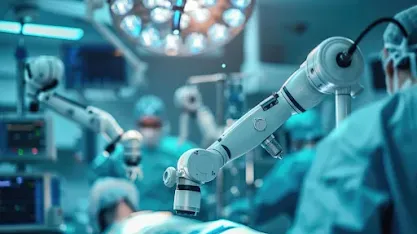Robotic Knee Replacement Surgery Milestone in India, focusing on the recent achievement at Gauhati Medical College in Assam and its broader implications
Background on Robotic Knee Replacement Surgery
Robotic knee replacement surgery represents a significant advancement in orthopedic care. Unlike traditional knee replacement, where surgeons manually align and position implants, robotic-assisted surgery uses advanced technology—such as robotic arms, 3D imaging, and computer navigation—to enhance precision. This method allows for:
- Greater Accuracy: Preoperative planning with 3D models ensures the implant fits the patient’s unique anatomy.
- Minimally Invasive: Smaller incisions reduce tissue damage, blood loss, and recovery time.
- Improved Outcomes: Better alignment can lead to longer-lasting implants and improved joint function.
Globally, robotic-assisted knee surgeries are on the rise. In India, this technology has been adopted by leading private hospitals over the past decade, but its integration into government-run institutions like Gauhati Medical College marks a new milestone.
 |
| Image source Google |
Milestone at Gauhati Medical College
Earlier this month (March 2025), Gauhati Medical College (GMC) in Guwahati, Assam, performed the state’s first robotic knee replacement surgery. This event is a landmark for several reasons:
- Pioneering Public Healthcare: GMC, established in 1960, is a premier government medical institution in Northeast India. Its adoption of robotic surgery reflects a commitment to bringing cutting-edge technology to public healthcare, which is often resource-constrained compared to private facilities.
- Technological Leap: The surgery demonstrates Assam’s growing capability to execute tech-driven medical procedures. It involved the use of robotic systems to assist surgeons in precisely removing damaged knee tissue and installing prosthetic components.
- Regional Impact: As the first such procedure in Assam, it sets a precedent for other government hospitals in the region, potentially reducing the need for patients to travel to metropolitan cities like Delhi or Mumbai for advanced treatments.
Assam Chief Minister Himanta Biswa Sarma announced this achievement, emphasizing its role in elevating healthcare standards. The successful surgery at GMC underscores the state government’s focus on modernizing medical infrastructure.
 |
| Image source Google |
Context of Knee Replacement in India
Knee replacement surgery is increasingly common in India due to:
- Aging Population: With rising life expectancy, more individuals suffer from osteoarthritis and other degenerative joint conditions.
- Lifestyle Factors: Sedentary habits, obesity, and sports injuries contribute to knee issues among younger populations.
- Medical Tourism: India is a hub for affordable, high-quality orthopedic surgeries, attracting patients globally.
Traditionally, these surgeries relied on manual techniques, but robotic systems have gained traction since their introduction in India around 2015–2016. Private hospitals like Apollo, Fortis, and Max have led the way, but the high cost of robotic systems (often ₹10–15 crore) has limited their availability in public institutions—until now.
 |
| Image source Google |
Future Plans: Robotic Surgery Units in Assam
The success at GMC is just the beginning. Plans are underway to establish full-fledged robotic surgery units in three major cities of Assam:
- Guwahati: As the state’s largest city and home to GMC, it will likely serve as the central hub for robotic surgeries.
- Dibrugarh: Assam Medical College and Hospital (AMCH), another historic institution, is set to launch a robotic surgery unit in November 2024 (as announced earlier), with expansions planned for 2025.
- Silchar: Silchar Medical College and Hospital, serving southern Assam, will extend these capabilities to the Barak Valley region.
These units aim to:
- Enhance Accessibility: Bring advanced care closer to rural and semi-urban populations.
- Reduce Costs: Public hospitals can offer subsidized rates compared to private facilities, where robotic knee surgery costs ₹2–4 lakh versus ₹1–2 lakh for traditional methods.
- Train Professionals: Equip local surgeons and staff with skills in robotic techniques, fostering expertise in the region.
Significance for Tech-Driven Healthcare
This milestone points to a future where technology plays a central role in Indian healthcare, particularly in Assam:
- Bridging the Urban-Rural Gap: Northeast India has historically lagged in healthcare infrastructure. Robotic surgery units could decentralize advanced care, benefiting underserved areas.
- Economic Implications: By reducing patient travel and improving recovery times, these advancements could lower overall healthcare costs for individuals and the state.
- Global Competitiveness: India’s growing adoption of robotic surgery strengthens its position as a leader in medical innovation and tourism.
Challenges Ahead
While promising, this shift faces hurdles:
- Cost and Maintenance: Robotic systems are expensive to acquire and maintain, requiring sustained government funding.
- Training: Surgeons and support staff need specialized training, which could strain resources initially.
- Patient Awareness: Educating the public about the benefits and safety of robotic surgery will be key to its acceptance.
Conclusion
The first robotic knee replacement surgery at Gauhati Medical College in March 2025 is a transformative moment for Assam and India’s public healthcare system. It showcases the growing integration of technology in medical procedures and sets the stage for a network of robotic surgery units in Guwahati, Dibrugarh, and Silchar. This development not only improves patient care but also signals a tech-driven future for healthcare in the region, aligning with India’s broader push toward innovation and accessibility in medicine.




No comments:
Post a Comment